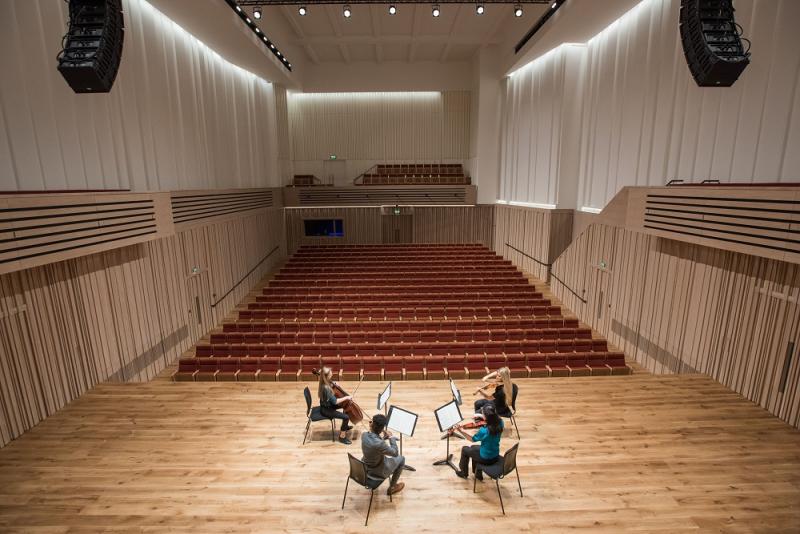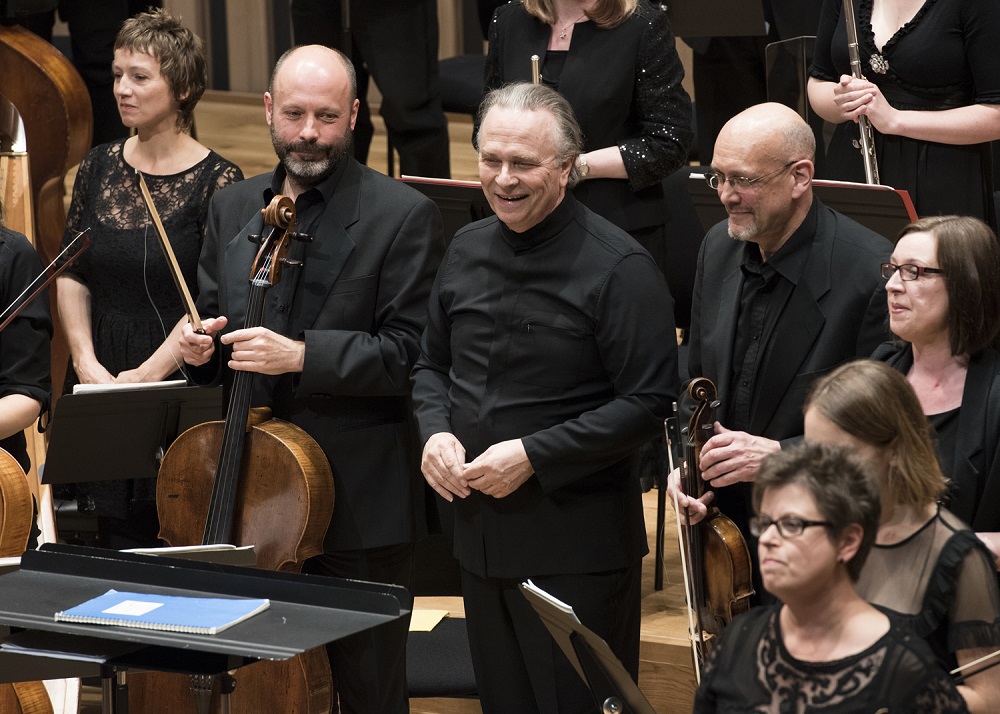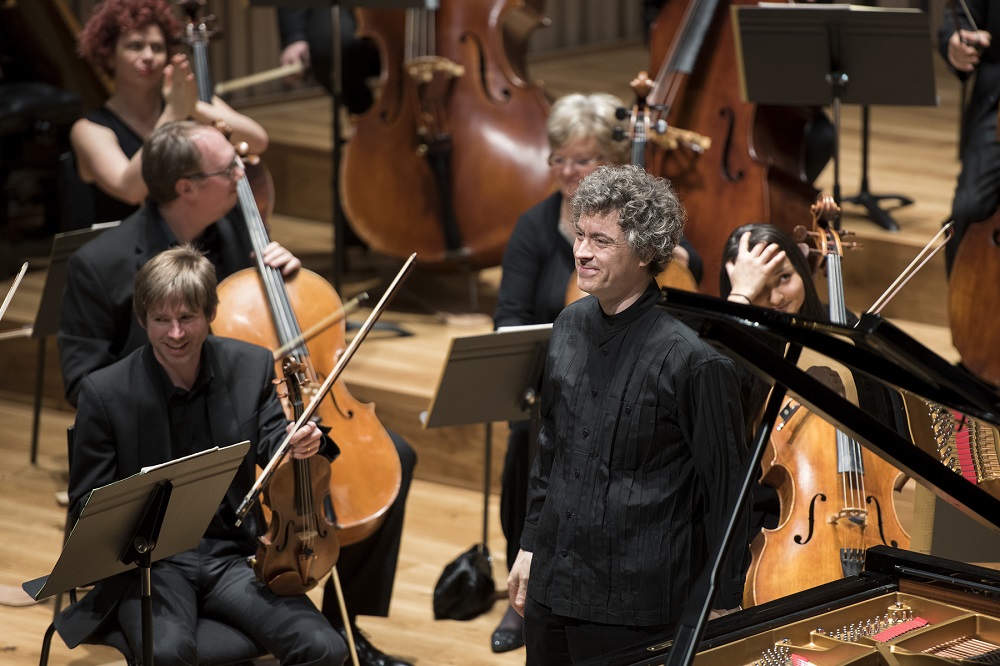Stoller Hall Opening, Chetham's School of Music, Manchester | reviews, news & interviews
Stoller Hall Opening, Chetham's School of Music, Manchester
Stoller Hall Opening, Chetham's School of Music, Manchester
New performance venue christened with a high-spirited weekend

The opening of a new concert hall offers two options for opinionizing: the venue itself – or the performances in it? Review the acoustics – or the music? It has to be a mixture of the two, in the end.
It’s been constructed, "box in box" style for perfect sound insulation, inside the main new Chetham’s building erected in 2012. The missing ingredient on that previous opening day was the main auditorium at the heart of the original plan, accessible from the outside world like any other, but also part of the educational facilities of the UK’s largest specialist music school. The first thing to be said is that it gives central Manchester a resource it has needed for some time: a smallish (but not tiny) venue ideal for chamber music and recording. Those purposes are being emphasized from the outset, and rightly.
The acoustic is adjustable by using mobile sound-absorbent banners, and though the permanent stage cannot take more than a pretty large chamber orchestra and piano (they have their own Steinway D), there is an extension which will allow for a full symphony orchestra when raised up from floor level, though it reduces the audience capacity. (It would also make a nicely springy dance floor, judging from walking on it in its "normal" seat-bearing position, though maybe that will never be put to the test).

The sound of the Navarra String Quartet was the first chamber music to be officially public in the opening weekend, as they played Schubert’s Quartettsatz, Beethoven’s Opus 18 No 1 and Shostakovich’s Fifth Quartet. In its undampened state, the acoustic was very bright – absolutely clear and if anything slightly over-sympathetic to the higher end of the spectrum. (It’s tempting to view things like a hi-fi freak twiddling bass and treble response knobs, and I must admit I wanted to turn the woofer up a bit – but the acousticians tell us they wanted to avoid the sound being "boomy", so that explains the impression somewhat). Sitting upstairs in the small balcony for the second part of the programme, I found the wooden stage and back wall gave a more even spread: I wouldn’t be surprised if those 45 seats become the ones everybody wants to have).
As for the performance, the Navarra – a Manchester-formed quartet – played their Beethoven first movement in graceful and genial style, with flashes of fire and fury showing through; their Adagio sensitive and with an appealing cello voice; and their finale working up to a fine peak of emotion just the right side of hysteria. In Shostakovich the slow movement held us in its spell, with technically superlative long, vibrato-less, sustained notes, and the finale was passionate and completely engaging in its self-revelation.
Young musicians of the 10 Greater Manchester boroughs came together for a specially written opening piece called City Always Being Rebuilt, by Michael Betteridge, as the first public orchestral music in the Stoller Hall. It was a reminder that the hall is there for the young and their music as much as for the established professionals, and proved that the acoustic is a match for bigger sounds and wraps them in real warmth.

The grand, royal Opening Celebration Concert had two bodies of players: first Chetham’s Chamber Orchestra, conducted by their director of music Stephen Threlfall (pictured above), and with Manchester Chamber Choir and guests. Former Royal Northern College of Music principal Edward Gregson wrote them a Fanfare for a New Era, using the balcony to position a solo trumpet on high and answering it with groups of brass and percussion on stage. With the sound absorbers in position, the hall could amply handle that kind of amplitude and thrill with its immediacy.
Samuel West was the ideal narrator for Henry V: A Shakespeare Scenario, containing much of Walton’s film music within 30 minutes and combining it with purple passages from the text: triply appropriate as it was St George’s Day, also the Bard’s birthday, and the music came from one of Oldham’s most famous sons – another being philanthropist Sir Norman Stoller, whose foundation donated most of the money for the new concert hall.The Chetham’s players made a very splendid job of this, with a subtly voiced string choir for "Touch her soft lips and part", a skilfully balanced full ensemble sound and a highly effective finale, tautly controlled by Stephen Threlfall and confidently played.
Kitty Whately, a Chet’s alumna, was soloist in Brahms’s Alto Rhapsody, her rich, strong voice quality coming over with beauty and the young orchestra adapting well to the sumptuous writing. Another former student, Paul Lewis, was soloist with the afternoon’s second orchestra, a specially formed gathering from the Hallé, BBC Philharmonic, Manchester Camerata, Northern Chamber Orchestra, Chet’s own staff and students and others, conducted by Sir Mark Elder (pictured in first image above)and led by Adi Brett. There was an immediate impression, hearing what would have been judged in a large hall to be a relatively small ensemble, that – even sitting on the next-to-back row of the stalls – this acoustic delivers the music as if every hearer is in the conductor’s shoes. It’s an exciting experience and one worth sharing.

In Beethoven’s Second PIano Concerto the Steinway sound was crisp and resonant, and Lewis’s interpretation thoughtful and stimulating as always (the pianist pictured above), with some interesting experiments in resonance, provoked by Beethoven’s enigmatic instructions, at the close of the second movement. A celebratory, energetic mood pervaded the Rondo.
The last work was Ginastera’s Variaciones Concertantes – an inspired choice, as it spotlights many orchestral sounds and their creators, contains the personnel required within reasonable limits for a small stage, and finally delivers a gloriously latin rhythmic punch, apt for a party. Elder was in his element, drawing playing at times as evocative in its way as Walton’s tenderest moments, and at times as high-spirited as the occasion warranted. Quite so.
- Further events at the Stoller Hall listed here
- Read more classical music reviews on theartsdesk
rating
Share this article
The future of Arts Journalism
You can stop theartsdesk.com closing!
We urgently need financing to survive. Our fundraising drive has thus far raised £49,000 but we need to reach £100,000 or we will be forced to close. Please contribute here: https://gofund.me/c3f6033d
And if you can forward this information to anyone who might assist, we’d be grateful.

Subscribe to theartsdesk.com
Thank you for continuing to read our work on theartsdesk.com. For unlimited access to every article in its entirety, including our archive of more than 15,000 pieces, we're asking for £5 per month or £40 per year. We feel it's a very good deal, and hope you do too.
To take a subscription now simply click here.
And if you're looking for that extra gift for a friend or family member, why not treat them to a theartsdesk.com gift subscription?
more Classical music
 From Historical to Hip-Hop, Classically Black Music Festival, Kings Place review - a cluster of impressive stars for the future
From quasi-Mozartian elegance to the gritty humour of a kitchen inspection
From Historical to Hip-Hop, Classically Black Music Festival, Kings Place review - a cluster of impressive stars for the future
From quasi-Mozartian elegance to the gritty humour of a kitchen inspection
 Shibe, LSO, Adès, Barbican review - gaudy and glorious new music alongside serene Sibelius
Adès’s passion makes persuasive case for the music he loves, both new and old
Shibe, LSO, Adès, Barbican review - gaudy and glorious new music alongside serene Sibelius
Adès’s passion makes persuasive case for the music he loves, both new and old
 Anja Mittermüller, Richard Fu, Wigmore Hall review - a glorious hall debut
The Austrian mezzo shines - at the age of 22
Anja Mittermüller, Richard Fu, Wigmore Hall review - a glorious hall debut
The Austrian mezzo shines - at the age of 22
 First Person: clarinettist Oliver Pashley on the new horizons of The Hermes Experiment's latest album
Compositions by members of this unusual quartet feature for the first time
First Person: clarinettist Oliver Pashley on the new horizons of The Hermes Experiment's latest album
Compositions by members of this unusual quartet feature for the first time
 Gesualdo Passione, Les Arts Florissants, Amala Dior Company, Barbican review - inspired collaboration excavates the music's humanity
At times it was like watching an anarchic religious procession
Gesualdo Passione, Les Arts Florissants, Amala Dior Company, Barbican review - inspired collaboration excavates the music's humanity
At times it was like watching an anarchic religious procession
 Classical CDs: Camels, concrete and cabaret
An influential American composer's 90th birthday box, plus British piano concertos and a father-and-son duo
Classical CDs: Camels, concrete and cabaret
An influential American composer's 90th birthday box, plus British piano concertos and a father-and-son duo
 Cockerham, Manchester Camerata, Sheen, Martin Harris Centre, Manchester review - re-enacting the dawn of modernism
Two UK premieres added to three miniatures from a seminal event of January 1914
Cockerham, Manchester Camerata, Sheen, Martin Harris Centre, Manchester review - re-enacting the dawn of modernism
Two UK premieres added to three miniatures from a seminal event of January 1914
 Kempf, Brno Philharmonic, Davies, Bridgewater Hall, Manchester review - European tradition meets American jazz
Bouncing Czechs enjoy their Gershwin and Brubeck alongside Janáček and Dvořák
Kempf, Brno Philharmonic, Davies, Bridgewater Hall, Manchester review - European tradition meets American jazz
Bouncing Czechs enjoy their Gershwin and Brubeck alongside Janáček and Dvořák
 Solomon, OAE, Butt, QEH review - daft Biblical whitewashing with great choruses
Even a top soprano and mezzo can’t make this Handel paean wholly convincing
Solomon, OAE, Butt, QEH review - daft Biblical whitewashing with great choruses
Even a top soprano and mezzo can’t make this Handel paean wholly convincing
 Two-Piano Gala, Kings Place review - shining constellations
London Piano Festival curators and illustrious friends entertain and enlighten
Two-Piano Gala, Kings Place review - shining constellations
London Piano Festival curators and illustrious friends entertain and enlighten
 Echo Vocal Ensemble, Latto, Union Chapel review - eclectic choral programme garlanded with dance
Beautiful singing at the heart of an imaginative and stylistically varied concert
Echo Vocal Ensemble, Latto, Union Chapel review - eclectic choral programme garlanded with dance
Beautiful singing at the heart of an imaginative and stylistically varied concert
 Scott, Irish Baroque Orchestra, Whelan, RIAM, Dublin review - towards a Mozart masterpiece
Characteristic joy and enlightenment from this team, but a valveless horn brings problems
Scott, Irish Baroque Orchestra, Whelan, RIAM, Dublin review - towards a Mozart masterpiece
Characteristic joy and enlightenment from this team, but a valveless horn brings problems

Add comment